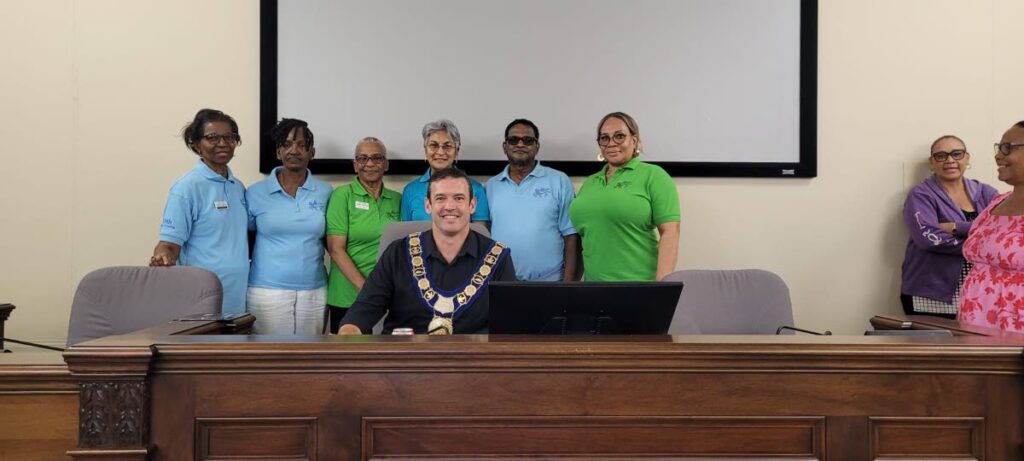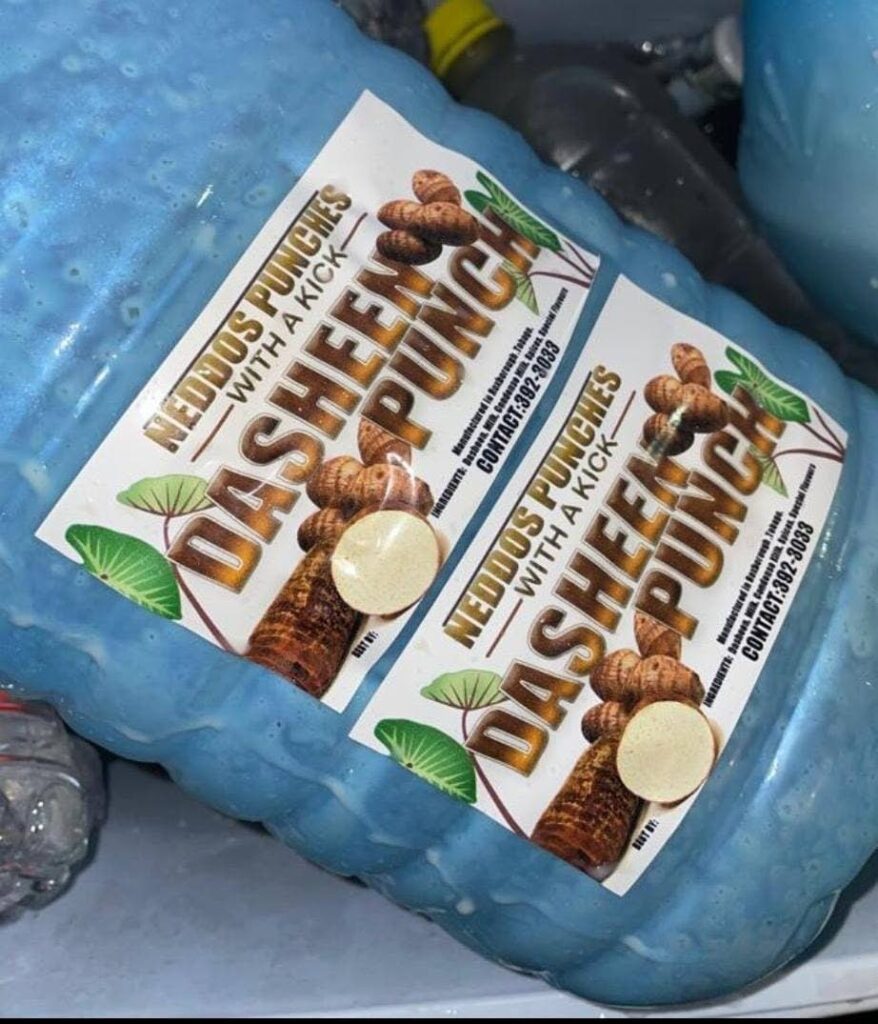|
Prime Minister Dr the Hon Keith Rowley is greeted by Prime Minister of Canada
the Hon Justin Trudeau, at the opening of the Canada-CARICOM Summit in Ottawa this morning. The summit is co-chaired by Prime Minister Trudeau and the current Chair of CARICOM, Prime Minister of Dominica, the Hon Roosevelt Skerrit. Climate change and resilience, access to finance and global financial architecture reform, Haiti, regional security, as well as trade and investment are among the issues that will form part of the summit’s agenda. (Source: Office of the Prime Minister of Trinidad and Tobago).
0 Comments
Twinning Association president Dave Peters At first sight, Port of Spain and St Catharines, Ontario, couldn’t be more different. About 4,000 kms north of Port of Spain, St Catharines is frozen during winter, and even as the eighth largest urban area in the province of Ontario, dwarfs its “twin city” in area and population. What the two cities have in common, Philip Atteck – the Trinidadian responsible for twinning the two cities – once said, are the warmth and vibrancy of their people. St Catharines (frequently misspelt and wrongly given an apostrophe), is in the Niagara Region and is one of its least populous with about 140,000 residents. A sizeable minority include Caribbean migrants and generational migrants, who have found comfort in one of Canada’s many welcoming cities. The flag of Port of Spain was recently hoisted by St Catharines mayor Mat Siscoe, at St Catharines City Hall, to commemorate the 55th anniversary of the twinning, an arrangement formalised in 1968. Twinning began after World War II when Japan, led by survivors of the catastrophic Hiroshima bombings, reached out to several European countries and cities, and approached the UN with an idea to “mundialise,” (from the word French word mondial, meaning "global”), with an end goal to prevent such human-caused tragedies from recurring. About two decades later, in 1965, Richard Hilker, a manager at Air Canada, asked Atteck, sales manager for Radio Guardian, to tour Canada to promote the Caribbean as a tourist destination for Canadians. Atteck travelled across the country, and with the support of donations and promotional materials, led a successful campaign to boost the Caribbean’s visibility as a tourist destination. During his tour, Atteck visited St Catharines, and the idea of twinning St Catharines and Port of Spain was conceived. Twinning committees were formed, and the cities officially twinned in 1968, embracing the UN Charter of Human Rights. The arrangement was formalised in August, 1968 when Hamilton Holder, shortly after becoming mayor of Port of Spain, officially declared Port of Spain a “mundialised city.” St Catharines mayor Mackenzie Chown was in Trinidad for the ceremony and declared his support for the newly twinned cities. Holder pledged on behalf of Port of Spain residents to “observe and uphold the universal declaration of human rights by the UN,” and “to join the rest of the world in the pursuit of peace, justice and friendly co-operation.” From there, the St Catharines Twinning Association was established. Atteck, who has been credited as the inspiration for the popular tourist attraction Festival of Lights in Niagara Falls, and served as honorary chairman of the association, died in 2009. The twinning arrangement led to a number of benefits, including free surgical treatment for Trinidadian children in Toronto, and the Rotary Club of St Catharines outfitting an operating theatre in Port of Spain. Medical collaboration also occurred, with Canadian doctors working in Trinidad. The twinning fostered cultural exchanges, as people visited each other's cities and citizens from Port of Spain travelled to St Catharines for educational opportunities. Brock University facilitated field trips to Trinidad, and a scholarship was established in 1993 for a Trinidadian student at Brock. In 2008, Brock University established a full-tuition Twinning Scholarship for Trinidadian students, with several recipients graduating. A memorial for Atteck was placed at Brock University's International Building. Newsday spoke with the association’s president Dave Peters, who said although annual activities have been affected in the past few years because of the covid19 pandemic, they have returned in full swing to bring the best of Port of Spain culture to St Catharines to commemorate the 55th anniversary. Peters said there have been documented benefits of the linkage between the two cities. He referred to a letter written by a Canadian policeman, who visited and worked in Port of Spain for a month during the 1970s. The policeman wrote that he had learnt more about cultural sensitivity in race relations in one month in Port of Spain than he could ever be taught in any classroom. “So that was such a powerful experience to have that exchange and to be able to understand how the police in Port of Spain were handling the multicultural aspects (of the community)...” St Catharines is regarded as particularly significant in terms of Afro-Canadian history. Executive members of the St Catharines Twinning Association's Port of Spain executive flank St Catharines mayor Mat Siscoe during the recent 55-year anniversary celebrations. - American abolitionist Harriet Tubman lived there in the late 1850s, having led her family to a community of formerly enslaved people, including some of her other relatives. Tubman led many enslaved people to a church called Salem Chapel in St Catharines after the passing of the 1850 Fugitive Slave Act, which allowed for the capture and return of enslaved people to their “masters” within US territories. The church still stands and has been designated a historical landmark by the Canadian government.
Today, the city and the wider region are regarded as particularly open to migration and diversity, and are home to a significant Caribbean minority. Apart from the more formal arrangements, the association and its members routinely organise social events, such as cultural shows, pop-up markets and seasonal events. It only has some 65 formal members, but includes many non-members in its activities. Peters said the association is always open to new members. High on the agenda is its Parang in Niagara 2023, scheduled for December, a mini-festival of music, food, shopping and other activities. (Source: Newsday, October 17, 2023) TT's Caricom Youth Ambassador Samantha Rampersad at the Red House in Port of Spain after participating in Parliament's youth budget talks on October 4, 2023. Photos courtesy Samantha Rampersad. - "Your present situation is not your final destination."
This is one of the messages Caricom Youth Ambassador Samantha Rampersad wants young people to keep in mind as they navigate the challenges of life. Rampersad, 25, took up the position on September 8 and will continue in the role until July 31, 2025. She said all her work will focus on youth and national development. "I know this might sound very cliche, but helping people and trying to prepare a better world for the generations that come after me gives me a sense of belonging, happiness, and fulfilment.” She said the world is not a safe place and the crime situation in TT was already bad. She believes if TT does not progress in preserving its culture, society and youth, who are the future leaders, it may end up in a similar situation to the conflict between Palestine and Israel, and that is not the kind of world she wants her nephew or her future children to live in. “I see myself as being very fortunate and blessed to be born in TT, where we don't have those sorts of imminent attacks to worry about. “I see the duty falling on me, because if we, as the young people of this generation, don't fix it, nobody else is going to do it. So the onus is on us.” Rampersad said she has yet to be given guidelines as to her role as youth ambassador, but there were several projects she wanted to pursue and intended to pitch to Caricom. Her main idea involves the use of seaweed, as most Caribbean islands have it. Its abundance means it could be a cost-effective way to benefit people and the environment. Seaweed could be used to create building blocks, fertilisers and recycling bins. The idea for the blocks came about because she wanted to build a homework centre for Venezuelan migrants to access a stable and safe space for learning. However, the project was very expensive and there were few resources. She saw the idea of making blocks out of seaweed on social media, and thought it could be a solution to the problem. She also noticed pollution is a big problem in TT, as there is always litter on beaches and rivers. She believes recycling bins made of seaweed and putting on beaches could help minimise the issue. And seaweed fertiliser could provide a clean and sustainable option for farmers as an alternative to chemicals that make their way into streams and rivers. She said the project could be one to encourage Caribbean youth integration. Over the years Rampersad has volunteered with governmental, non-governmental and UN agencies and so understands her purpose and the impact she could have on the world through simple projects. In September of this year she was part of the UN Population Fund’s (UNFPA) Caribbean Forum on Population and Development in Antigua and Barbuda, where she discussed Caribbean population dynamics such as challenges with sexual health and reproductive rights, and accessing sexual health and reproductive information and services in the Caribbean. She has been training with the UN Alliance of Civilizations (UNAOC) as a young peace-builder, and is considering how TT could provide practical support for people who want to leave a life of crime and gangs. She said TT does not have proper programmes to reach people “on the ground” and give them the opportunity to leave their criminal lives behind: leaving a gang could be a death sentence, but there are no protective measures for young people who wanted to do so. She said on-the-job training or skills programmes are not enough, as if they leave, they would have no money or job to support themselves, and many could not get a job because of their history or home address. She is also president and founder of United by Diversity, an organisation started in 2016 as a pageant project focusing on the holistic development of young people. She and her “pageant sisters” revitalised it in 2018 and have since run awareness programmes focusing on young people on the topics of agriculture, sexual health and reproductive rights, crime and gender-based violence, the use of social media and other topics youths may not want to ask their parents about. In addition, she is the director of participation and youth adviser in the UNFPA Youth Advisory Group of TT, vice president of the Trinidad Youth Council, and co-founded the group Youths for Empowerment. Advocacy in beauty Rampersad’s advocacy started at 14. She just wanted the experience of being in a beauty pageant, so she entered the Miss Teen Beauty TT Pageant in 2012 and was first runner-up. “But then I realised if you're doing pageantry, you really have an opportunity and a platform to reach other young girls like yourself, who are actually willing to listen to you.” During a pre-university business management programme at UWI Roytec, she began speaking up on LGBTQIA+ rights, suicide prevention, and more. But her official journey into activism began in 2016, when she participated in the Miss Teen Awareness TT Pageant and had to choose a project highlighting a societal issue in her community in Chaguanas. "The reason I gravitated so much towards it was that, at that point in my life, I was searching for more. I wanted to really advocate, but advocate with a purpose. “Growing up in an East Indian household and just seeing your neighbours and people in your community condone domestic violence as if it was nothing, just a part of life – it didn't sit well with me. "And so when I joined this pageant, I was given the opportunity to speak about domestic violence. I researched it more, and that was really the building ground for me to speak on gender-based violence." She was crowned the winner. She said the process showed her how far she could go with activism, which has had the biggest impact on her life so far. Rampersad is in her final semester of a double major in political science and management studies at UWI, St Augustine. She is hoping to do a masters in international relations, but still has to decide on a university. She said she sees herself working in the diplomatic and international relations fields. While monetary compensation is important, it is not the driving factor in what she does. Rampersad said from a young age her parents taught her no matter how difficult things were, someone always had it worse, so she should always try her best to assist others. She said she grew up seeing her parents helping neighbours, family and friends, not just by giving them money or food, but listening to them or giving advice. “So my parents had a fundamental part to play in the foundation of me. Just by living through that experience with them and seeing it, I would have learned that behaviour. I could say they provided the fertile ground for me to, like, plant my roots with activism and go ahead and spread my wings if I wanted to share by branches.” She said her parents sacrificed a lot to provide for her and are very supportive, even though they do not fully understand all she does. Positive through pain Rampersad has had some painful and negative experiences in her young life. But instead of giving up on people or the world, she used them to propel her forward. She recalled shopping with her mother and a friend in a Port of Spain fabric store when a man held her and tried to drag her into the back of a panel van. She also had some scary experiences while taking public transport, and was raped by someone she thought was her friend. “Even now, every time I go into a taxi or maxi I’m always on fight-or-flight mode. You always have to be on the lookout for perpetrators. You never know who is going to touch you in a wrong way.” Her experiences led to trust issues with herself and others. Even with loving parents, she kept her rape to herself, out of shame. She was depressed and wanted to give up. She often contemplated suicide, but never succumbed to her negative thoughts, as she wanted her nephew to have an aunt in whom he could confide. It took two years before she could talk about her rape. She did so while attending the local leg of her first international pageant, Miss Supranational, in 2020. The pageant had a confessional segment in which the girls spoke about their traumas. She was not aware the organisers were going to release the video, which was how her family found out about the rape. She was additionally traumatised, as people insisted she tell them about the experience, but she eventually dealt with her emotional damage. On a positive note, after the video was released, women with similar experiences contacted her and she realised her story was helping others. She also realised how prevalent the sexual abuse of women and girls was in TT and the lifelong impact it had on its victims. She saw how victims lived with guilt and fear and demonised themselves, and realised because they did not speak about their experiences, they were not aware they were not alone. “All these things that happened to me is what really fuels my passion to do what I do. Now I can relate to a rape victim. I can sit down and I can truly understand your experience and we share each other's feelings. “Sometimes we see situations happening to us and we ask God why. We question so much, and we blame Him for so much, but you really don’t understand how that one situation can be the foundation or extra push in a direction that God really wants you to go.” Rampersad said her favourite quote is, "The future belongs to those who believe in the beauty of their dreams," by Eleanor Roosevelt, as it gives her comfort and helps her believe in herself. She said as she grew up in a middle-class family, her dreams seemed impossible to achieve. While she did not become a princess and no longer wanted to be a lawyer, she has achieved many other dreams, including becoming an activist, being a part of the UN, attending university, travelling abroad and helping other young people. “Life is not what happens to you but what you make out of it. It is never too late to start. Whatever your situation may be, understand that it is not your final destination. No matter how difficult your current predicament may be, you have the power and ability to live your dreams. Stay committed and disciplined with your goals and aspirations, and in all you do, believe in yourself – because if you don’t, you can’t expect others to believe in you.” (Source: Newsday, October 15, 2023) Alana Nedd with her popular dasheen punch. - Corey Connelly WITH her winning smile and girl-next-door personality, Alana Nedd has turned her dasheen punch business into a household name. Nedd, a police officer, has been promoting her brand, Neddos Punches With A Kick, at the Tobago Blue Food Festival for several years. She also sells the product to her customers on a part-time basis, mainly by orders. Asked how she came up with the name for her punch, Nedd, 40, became emotional. “There was an officer by the name of Kester Best and he was a very close friend of mine. He passed away not too long ago, and he gave me the name 'Neddos.' So I decided to at least honour his memory, my business would be called Neddos,” she told Sunday Newsday. Nedd described Best as an “awesome individual, excellent police officer and mentor and brother to me.” Today, Nedd will again be among the 30-plus vendors at the Blue Food Festival, which is celebrating its silver jubilee at the Bloody Bay Recreation Ground. She said the response to her dasheen punch continues to be phenomenal. “My customers are always amazed at how good it tastes. They will buy seconds, thirds, even buy for their friends. " Once a customer can confidently refer you, then you know you have a good thing.” Nedd described the taste as “bold, rich, satisfying and soothing. “It is just like Grandma used to make – a party in your mouth.” She said dasheen generally makes a good punch. “When it is boiled, it is slippery in texture and gives you that rich, starchy thickness when blended.” But Nedd laughed loudly when asked to share her secret. “What I can say is that it is made with lots of love.” Nedd tried several recipes before settling on her current blend. WITH her winning smile and girl-next-door personality, Alana Nedd has turned her dasheen punch business into a household name. Nedd, a police officer, has been promoting her brand, Neddos Punches With A Kick, at the Tobago Blue Food Festival for several years. She also sells the product to her customers on a part-time basis, mainly by orders. Asked how she came up with the name for her punch, Nedd, 40, became emotional. “There was an officer by the name of Kester Best and he was a very close friend of mine. He passed away not too long ago, and he gave me the name 'Neddos.' So I decided to at least honour his memory, my business would be called Neddos,” she told Sunday Newsday. Nedd described Best as an “awesome individual, excellent police officer and mentor and brother to me.” Today, Nedd will again be among the 30-plus vendors at the Blue Food Festival, which is celebrating its silver jubilee at the Bloody Bay Recreation Ground. She said the response to her dasheen punch continues to be phenomenal. “My customers are always amazed at how good it tastes. They will buy seconds, thirds, even buy for their friends. " Once a customer can confidently refer you, then you know you have a good thing.” Nedd described the taste as “bold, rich, satisfying and soothing. “It is just like Grandma used to make – a party in your mouth.” She said dasheen generally makes a good punch. “When it is boiled, it is slippery in texture and gives you that rich, starchy thickness when blended.” But Nedd laughed loudly when asked to share her secret. “What I can say is that it is made with lots of love.” Nedd tried several recipes before settling on her current blend. She believes: “The quality ingredients, special blend of spices, richness, the consistency and texture of the punch have all added to its uniqueness.” She is a bonafide country girl who navigated between L’Anse Fourmi and Bloody Bay as a child. She said her parents instilled sound values in their children and others, encouraging them to be self-sufficient. In hindsight, Nedd said she has been exposed to sales for all of her life. She said her mother did not have a government job, but always baked cakes, other delicacies and made fresh fruit juices to help support the family. “She even sold doubles at one point in time. So I’ve been a part of putting things out there for the public, the customers, in relation to food and beverage. But at that time, I never saw it as a career path.” Nedd credits her parents for her enterprising spirit. “It has truly been a blessing.” Owing to her parents' advice, Nedd said many of her relatives have established businesses in several areas, including poultry-rearing, arts and craft, makeup, photography and carpentry. “You name it, we do it.” She told Sunday Newsday her mother has been a cook at the festival almost from inception. “She makes a good dasheen punch and even won best drink a couple of years ago. So I had hands on knowledge of how to make a good punch and I started making my own special twist, tweaking the recipe so that one’s tastebuds can have an amazing experience.” Additionally, Nedd said the dasheen, being the most prominent of all the ground provisions in the L’Anse Fourmi/Parlatuvier/Bloody Bay area, “is the heart” of the Blue Food Festival. “A punch is always a well-loved drink. So it was easy to come up with a drink that was popular and would always sell because power equals prowess.” She is aware that the festival has been a platform to promote small entrepreneurs in Tobago over the years. and she's capitalising on this. Having Neddos Punches With A Kick on the shelves of major supermarkets and other establishments, Nedd said, “is in the making, as plans are under way to push the business and product on a larger scale.” Asked if she intends to market the punch internationally, she added, “We never know what the future holds. I thank God for his many blessings upon my life on a daily basis. So you know, the future is in God's hands.”  Alana Nedd says she tried several recipes before settling on her current dasheen punch blend. For now, Nedd said she tries her best to prepare the punches at least twice a month.
“It can be difficult as I am also a parent and a fitness enthusiast as well. So I always try to strike a balance between all. "However, I produce the product based on the number of orders numbers I get, and also based on the day of the week and time of the month.” She said she is always on the lookout for opportunities to showcase her product, whether it be at the farmers’ market or any other related forum or cultural show. “My experience has been mostly on the positive side. But the feedback from customers, both negative and positive, is always appreciated.” Asked if any of her customers had commented on its effectiveness in relation to endurance and sexual prowess, she said, “Well, I have been told that I have quite a few godchildren, and some on the way, by some of my male customers. So that should say a lot. "My female customers say it makes them extra spicy!” On the business side, she said there are quite a few institutions in Tobago, including the Division of Finance and the Economy, offering short courses in money management and starting a business. “I have been a part of this, and they continue to send information to previous participants which would aid in developing a successful business model.” Nedd said there is room in the market for anyone who believes they have a talent or special gift that can be harnessed. “One just has to find their niche, put their personal touch into it, and with determination, they can be successful.” (Source: Newsday, October 15, 2023) Another moving story by Richard Charan - Trinidad Express By Richard Charan Oct.11, 2023 Three men live under the Endeavour overpass along the highway in Chaguanas.
One appears to be a once-hopeful migrant, now a member of Trinidad’s growing underclass. The second, a dangerous-looking Indian fellow, has wasted away the low-quality drugs he is surely smoking. The third, his body and clothing caked in an equal amount of grime, is an ethnic mystery. He is like a silhouette. child born at quarters: The gateman’s wife, Phyllis Augustine. In a dry space under the bridge, they have their shopping carts, buckets, sponge beds and fireside. Anybody with work and business north of the Caroni would likely have seen these men. Because between 3 p.m. and nightfall, drivers are caught up in south-bound traffic gridlock around this area, five days a week. Crawling along at between zero and one kilometre per hour, there isn’t much else to look at, except the Venezuelan migrants selling plantain chips, or the teenagers hawking Coca-Cola and cotton candy. The gatekeeper’s quarters at Endeavour, Chaguanas. Since no one has a solution to this highway torture, suffering drivers might be interested in knowing there is a piece of built history near the overpass, hiding in plain sight. We can look at that instead, while wasting away part of our short lives. The railway house. You will see it just before the AMCO compound, under the billboards advertising rum. It is a building from the time of the Trinidad Government Railway (TGR). It was once the home of Mr Kennedy Augustine, who was assigned the accommodation since he needed to stay close to the railway tracks and respond to the approaching locomotives. He held the position of gatekeeper, with the job of controlling the barrier across what was then the two-lane Princes Margaret Highway, to allow for the road crossing of the passenger trains coming from the north and east. Back then, drivers could only reach the dead-end Chaguanas roundabout before turning into the Central Trinidad town, and then on to San Fernando along the Old Southern Main Road. That roundabout was replaced around 1966 with what we now see as the elevated Chaguanas overpass after Government invested in a 1.4-mile (2.3-kilometre) highway extension to Chase Village. Another 14 miles (22.5 kilometres) of highway was completed in the early ’70s by the same contractor—George Wimpey and Company. But before all that development, Augustine still held an important job, having earned a promotion from platelayer (laying down and maintaining the tracks) to gateman, with one of the perks being the three-room quarters, which was already old since the railway had extended through Chaguanas to Couva by 1882. The Endeavour location was likely the same one mentioned in VS Naipaul’s 2003 book Literary Occasions where he wrote, “Not far from my mother’s family house in Chaguanas was the railway crossing. Twice or four times a day an old one-armed negro closed and opened the gates. Did this man have a story? The man himself didn’t seem to think so. He lived in absolute harmony with the vacancies of his calling...”. It appears Augustine spent that downtime between gatekeeping calls in a rather fertile way. Born in Grenada in 1915, he left his wife and four children there in 1941 to look for work on the big island of Trinidad. He found jobs in the World War II construction boom before getting his break in the railway. And with a permanent position, he sent for his wife, Phillis, and his children. They would have five more in Endeavour, one of them being born, suddenly, in the railway quarters. Those were lean but happy days, said his youngest child, 69-year-old Audrey Farrell, who remembered the area being cultivated lands, with fields of orange and coconuts, breadfruit and bison, all of it surrounded by the sugarcane fields. “When the train passed, the engine driver would stop and pick us up right here where we lived, and daddy would go open the gate for the train to pass across (where the north-bound lanes of the Uriah Butler highway now pass). The last train to San Fernando rolled in August 1965, and Augustine’s job became redundant. He got a job in the Food and Drugs Division in Port of Spain, and the family supplemented their income by selling vegetables on the highway shoulder. All nine children grew up in the quarters, and several still occupy the property, with children and grandchildren. Phyllis died early, at age 57, but railway man Alexander lived on. He was 89 when he died 18 years ago, to be survived by his house, now occupied by two grandsons and a son. They intend to maintain the property until the passage of time takes its timber. And while you sit in the traffic, consider this. If you had taken a 1960s passenger train from Port of Spain to San Fernando today, you would be home by now. NOTE: At its peak, the Trinidad Government Railway laid down more than 118 miles (190 kilometres) of track, and reached Siparia, Sangre Grande, Rio Claro, Princes town, Port of Spain, Chaguanas, Tabaquite, Couva and San Fernando, with plans to take it all the way to Erin, Toco, and Guayaguayare, according to the research of railway historian Glen Beadon, who has written the authoritative book The Railways of Trinidad. The system closed for good on December 31, 1968, because it became unprofitable. It was killed by the emergence of port facilities, improved road conditions, and the greater use of buses, taxis,and the private cars now clogging every secondary and primary road. Ten to One’s Oloroso Sherry Cask Finish. Ten to One Rum has introduced one of its coveted Limited Edition “Cask Select” series here in Trinidad & Tobago.
The brand, founded by Trinidadian Marc Farrell and co-owned by GRAMMY award winning artist Ciara, is known for its versatile and unique Pan-Caribbean blends. Farrell said: “At Ten to One, we talk a lot about ‘re-imagining rum’, which for us means challenging consumer expectations and driving product innovation. We aim to bring a new, limited edition blend to market every year, encouraging consumers to explore the unexpected.” He continued: “This first release in our ongoing Cask Select series was designed to be a very limited offering, but it was important to me that Ten to One’s special edition products be made available in Trinidad, my home country. Since we’ve sold out in North America, Trinidad is now the only place in the world where you can buy cases of Ten to One’s Oloroso Sherry Cask Finish.” The Ten To One Oloroso Sherry Cask Finish is a unique take on Ten To One's award-winning Dark Rum, a blend of Caribbean Rums from Trinidad and Tobago, Barbados, Jamaica, and the Dominican Republic, that receives a finish in Oloroso Sherry casks, bringing an aromatic hint of sherry to the aged dark rum. Enjoy it on the rocks, or mixed in a range of cocktails. “From the outset, we’ve taken a great deal of pride in bringing new innovation and excitement to the rum category, and the Oloroso Sherry Cask finish quickly emerged as a favourite amongst Ten To One customers and collectors alike, with those sweeter Sherry notes playing delightfully alongside the nuance of Ten To One’s aged rum blend,” Farrell said. Ten To One Oloroso Sherry Cask Finish Caribbean Dark Rum is distributed in Trinidad and Tobago by the Brydens Group. (Source: The Loop, July 31, 2023)  Finance Minister Colm Imbert has presented the budget for fiscal 2024 in the House of Representatives. As he laid out the allocations for each sector, the Minister expressed optimism over projected economic growth and the resilience of the Heritage and Stabilisation Fund (HSF). He said: “I am confident that the estimates under this budget framework will materialise and ensure that the economic recovery is anchored on sound and stable macroeconomic conditions.” See highlights from the Minister's budget presentation below: Total Revenue $ 54.012B Expenditure $59.209B Oil revenue: $16.709B Non-oil revenue: $35.547B Capital Revenue: $1.756B Projected deficit of $5.197B (2.7 per cent of GDP) Education & Training $8.022B Health $7.409B National Security $6.912B Works and Transport $3.394B Public Utilities $3.018B Rural Development and Local Government $1.825B Agriculture $1.442B Housing $1.165B Social Development $5B Tobago: $ 2.585B 1. Government proposed an increase in the national minimum wage to $20.50 from $17.50 per hour. 2. The collection of property tax from residential owners is set to begin in fiscal 2024. 3. A total of 65,000 students in need will receive $1,000 grant for books and uniforms. 4. A total of $357M in housing projects will start this year. 5. An online payment ecosystem is being developed to allow for the payment of taxes as part of the drive to a digital economy. 6. Strategies to assist SMEs to gain improved access to forex will be implemented in fiscal 2024. 7. Government will allocate $90M for the purpose of procuring four container scanners at the Port of Port-of-Spain. (Source: The Loop, October 2, 2023) |
T&T news blogThe intent of this blog is to bring some news from home and other fun items. If you enjoy what you read, please leave us a comment.. Archives
June 2025
Categories
All
|











 RSS Feed
RSS Feed